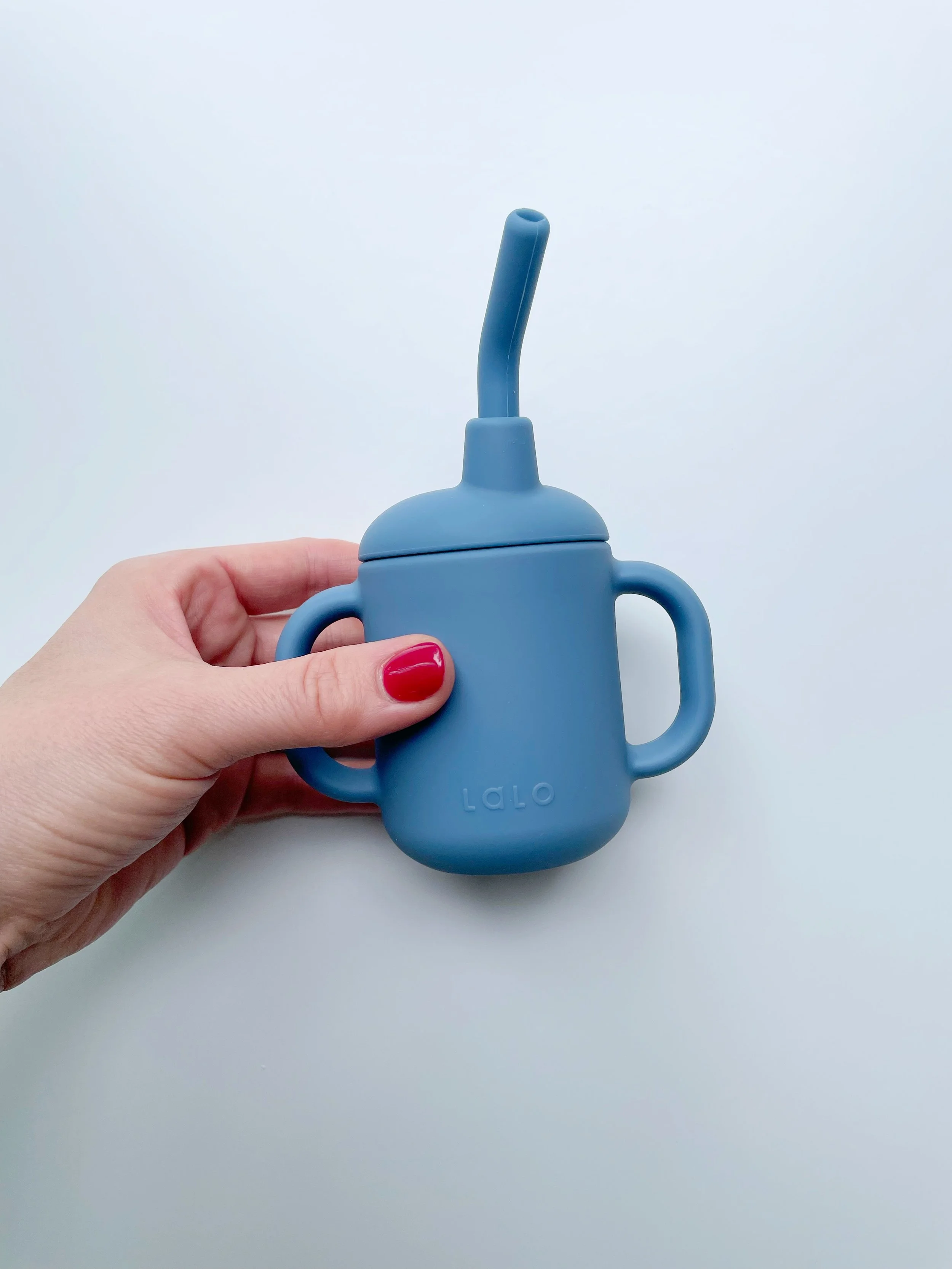5 Simple Baby Constipation Remedies
What you need to know about infant constipation...
It’s been longer than usual since your baby’s last dirty diaper. Now your baby is showing signs of pain and discomfort...
Oh, no. Your baby is constipated! Now what?
As a pediatric dietitian, many parents ask me how they can relieve their baby’s constipation without medication.
Here are a few tried and true baby constipation remedies that are easy, natural, and that parents can do at home. Keep reading to find out more (and to learn what’s next if these don’t work).
What Causes Constipation in Babies ?
Every baby's bowel movement frequency and stool quality are different. So there's no one size fits all, and poop frequency and quality really depends on how old your baby is and whether they're eating solids yet.
According to the American Academy of Pediatrics, formula-fed babies may go 1 to 2 days between bowel movements. And, breastfed babies can go several days or even a week.
It's totally normal for young babies to poop infrequently. This is because all the nutrients from formula and breast milk are used to help the baby grow.
But that doesn't mean babies don't get constipated. Here are some of the most common reasons your little one might be straining more than usual to go number two.
1. Diet Changes
When you think about it, a baby’s diet is constantly changing.
Changes in the type of formula, transitioning from breast milk to formula, and introducing solids impact a baby's stool quality.
Babies still get enough fluids from formula and/or breast milk to stay hydrated when they wean from all-liquid forms of nourishment to solids, starting at about 6 months of age. But they're drinking fewer bottles to make room for baby food, and their digestive systems slow down to process and absorb the nutrients from solid food. As a result, a baby's stool gets harder, and sometimes this causes constipation.
2. Milk Intolerance
Food intolerances target the digestive system. So, if your baby is intolerant to cow's milk, they may experience belly discomfort, diarrhea, or constipation.
3. Medication
Certain medications and over-the-counter iron supplements cause constipation. For example, Tylenol is usually well-tolerated, but one of the most commonly reported side effects in infants is constipation.
Baby multivitamins typically don't contain iron. Most babies don’t need an iron supplement, but if your pediatrician recommends one for a certain reason, constipation is a common side effect.
4. Prematurity
When babies are born prematurely, their digestive systems aren't fully developed. The second and third trimesters are a critical time for the development and function of the GI tract. If infants are born before the second or third trimester, their immature digestive system can struggle to digest and absorb foods. So, constipation and other digestive problems are common in premature babies.
Signs of Baby Constipation
The telltale sign of baby constipation is more or fewer stools than what's normal for your baby. It’s common for many babies to strain when pooping, so straining a little isn't necessarily a sign that they're constipated.
What's typical for your baby may not be normal for another’s regular eating and pooping pattern. So, a good way to determine if your baby is backed up is to look for changes in your unique baby’s normal patterns of eating and pooping.
Some signs parents can look out for if they’re worried their baby isn’t pooping enough are:
Spitting up more than usual
Increased fussiness
Straining more than usual but isn’t able to poop
The stool is unusually hard, or you see blood in the stool
5 Natural Baby Constipation Remedies
Understandably, many parents don't want to use medication for their baby until they've tried everything else.
Here’s a list of simple baby constipation remedies you can try to help relieve your baby’s discomfort.
1. Start with liquids
The American Academy of Pediatrics suggests offering 1 oz of 100% apple or pear fruit juice for every month of life. For example, a 3-month-old can have up to 3 oz of juice in a day to help relieve constipation. I recommend offering a small amount (1-2 oz) of juice at a time instead of all at once.
Juice usually isn't recommended for babies younger than 12 months. But, it's okay during infant constipation when babies need a little help moving things along in their GI tract.
The sugar in juice causes more water to enter their bowel. That rush of water loosens the stool and helps your baby finally go!
(P.S. that’s why older children sometimes get loose poops when they drink juice).
Or, it could be an intolerance to the type of formula your baby eats. Too much milk can also cause constipation.
What about water? According to the American Academy of Pediatrics, babies younger than 6 months old don’t need to drink water. They get enough fluids from formula and breast milk. On hot days they'll need more fluids, so offer more formula or breast milk than their usual feeding schedule.
However, 6-12-month-olds can have up to 1 cup of water per day, and offering a small amount (1-2 oz) with meals can help prevent constipation without displacing breast milk or formula.
2. Change up the diet
Baby favorites like bananas and rice cereals can sometimes “bind” your baby and harden their poop, making it harder to pass stool.
A baby's diet tends to be relatively lower in fiber and made up of easy-to-digest foods like pureed fruits and vegetables.
Don’t worry! If your baby is eating solids, there are baby-friendly foods you can offer your little one to move things along again.
Pureed peas or prunes are a simple addition to the menu. Don't overdo it on the prunes, though. Too much can cause tummy discomfort.
Change up the cereal. Instead of rice cereal, offer barley and multigrain cereals such as oatmeal cereal, which has more fiber.
You can also get creative by offering chia seeds or hemp seeds. They’re packed with fiber. Yes, babies can have these!
BLW Blueberry Muffin with Prune puree and Ricotta Cheese
3. Exercise
Physical activity keeps the GI system moving for both adults and babies.
Soon enough, you'll be chasing your little one around the house. But, how does a young baby get exercise before they're walking?
Parents can exercise a baby by lying their baby on their back. Then, move the baby's legs in a bicycle motion. This movement can stimulate the bowel and help them poop.
4. Baby massage
Massaging your infant has many benefits. It calms them when they're fussy, teething, or sick, and it can even help improve constipation!
Infant massage can be a more effective remedy for baby constipation than medication.
Maybe you don’t know how to give your baby an infant massage, or you're afraid you'll hurt your baby. It’s easy and you’re probably doing some form of massage already. All you have to do is gently rub your baby's feet, legs, arms, tummy, and head. Make it part of their daily routine to help them relax for naps.
5. A Warm Bath
A warm bath helps soothe and relax your baby's tense muscles. Babies don’t have control over bowel movements yet but when they’re constipated those muscles are tense and contracted. A soothing bath can help!
What if Natural Remedies Don’t Work ?
Constipation can be dangerous for kids and adults if it goes on for too long. So, if the natural remedies don't work after a few days, call your baby's pediatrician if you see any of these signs:
There’s blood in the stool
Your baby appears to be in pain
Your baby starts vomiting, and their belly looks swollen
The home remedies haven’t worked
The next step is usually glycerin suppositories or baby laxatives. But these solutions should only be used occasionally.
Glycerin suppositories don't contain stimulants. Instead, they're glycerin-filled capsules that dissolve inside your baby's rectum and soften the poop so it can easily pass through.
Another option is baby laxatives, which are taken orally. Baby laxatives stimulate the GI system to move things along faster. Laxatives usually contain stimulants, so they’re best saved as the last resort.
As always, parents should discuss medication with their pediatrician before offering it to their baby.
What baby constipation remedies have worked for you? Let me know in the comments!
Final Thoughts
Prevention is easier than management when it comes to constipation!
Ensuring good hydration, providing a variety of foods once baby starts solids, including some fiber in the diet, and watching for any signs of food intolerances can help.
If you’re getting ready to start your baby on solids, download my FREE Baby-Led Feeding Essential Checklist to make sure you have everything you need to get started. You might also want to check out my new online course for parents, based on my best-selling book which will walk you through the whole process of starting solids using a baby-led approach.
Alternatively, if your baby is almost ready to start solids and you’re looking for someone you trust to map out the entire first 12 weeks of your baby’s solid food feeding journey, check out my new Safe & Simple 12 Week Meal Plan! Over 30 recipes, weekly shopping lists, tons of balanced baby meals, a complete plan for top allergen introduction, & lots of guidance (with photos) on how to safely serve each food.
And if you're looking for personalized nutrition support for yourself, your babies and/or your kids, I am currently accepting new clients in my virtual private practice. Looking forward to meeting you online…










